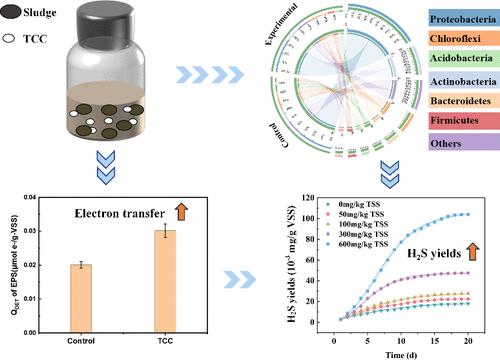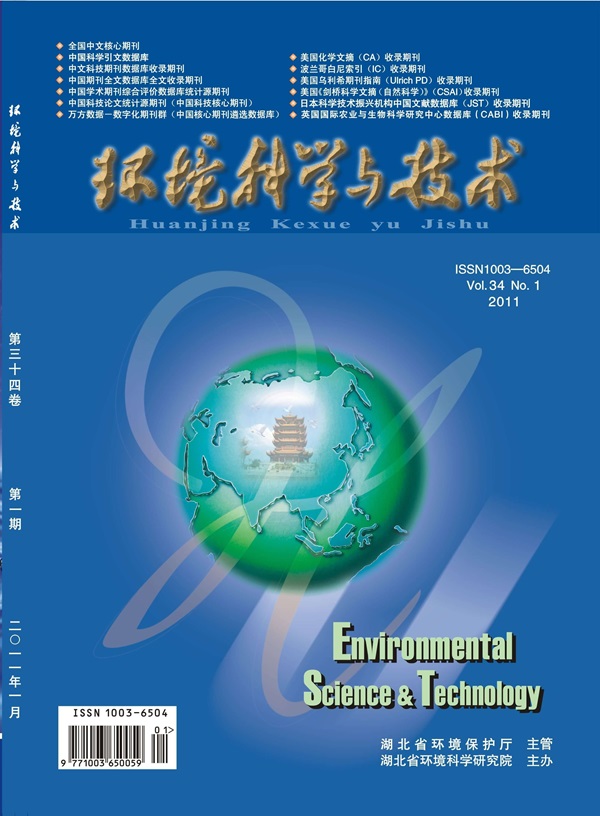How Does Triclocarban Affect Sulfur Transformation in Anaerobic Systems?
IF 10.8
1区 环境科学与生态学
Q1 ENGINEERING, ENVIRONMENTAL
引用次数: 0
Abstract
Triclocarban (TCC), as a typical antimicrobial agent, accumulates at substantial levels in natural environments and engineered systems. This work investigated the impact of TCC on anaerobic sulfur transformation, especially toxic H2S production. Experimental findings revealed that TCC facilitated sulfur flow from the sludge solid phase to liquid phase, promoted sulfate reduction and sulfur-containing amino acid degradation, and largely improved anaerobic H2S production, i.e., 50–600 mg/kg total suspended solids (TSS) TCC increased the cumulative H2S yields by 24.76–478.12%. Although TCC can be partially biodegraded in anaerobic systems, the increase in H2S production can be mainly attributed to the effect of TCC rather than its degradation products. TCC was spontaneously adsorbed by protein-like substances contained in microbe extracellular polymers (EPSs), and the adsorbed TCC increased the direct electron transfer ability of EPSs, possibly due to the increase in the content of electroactive polymer protein in EPSs, the polarization of the amide group C═O bond, and the increase of the α-helical peptide dipole moment, which might be one important reason for promoting sulfur bioconversion processes. Microbial analysis showed that the presence of TCC enriched the organic substrate-degrading bacteria and sulfate-reducing bacteria and increased the abundances of functional genes encoding sulfate transport and dissimilatory sulfate reduction.

三氯卡班如何影响厌氧系统中的硫转化?
三氯卡班(TCC)作为一种典型的抗菌剂,会在自然环境和工程系统中大量积累。这项研究调查了 TCC 对厌氧硫磺转化的影响,尤其是有毒 H2S 的产生。实验结果表明,TCC 可促进硫从污泥固相流向液相,促进硫酸盐还原和含硫氨基酸降解,并在很大程度上提高厌氧 H2S 产率,即 50-600 mg/kg 总悬浮固体(TSS)TCC 可使 H2S 累积产率提高 24.76-478.12%。虽然在厌氧系统中 TCC 可被部分生物降解,但 H2S 产量的增加主要归因于 TCC 的作用而非其降解产物。TCC被微生物胞外聚合物(EPSs)中所含的类蛋白物质自发吸附,吸附的TCC提高了EPSs的直接电子传递能力,这可能是由于EPSs中电活性高分子蛋白含量增加、酰胺基团C═O键极化以及α螺旋肽偶极矩增加所致,这可能是促进硫生物转化过程的一个重要原因。微生物分析表明,TCC 的存在富集了有机底物降解菌和硫酸盐还原菌,并增加了编码硫酸盐转运和异氨硫酸盐还原的功能基因的丰度。
本文章由计算机程序翻译,如有差异,请以英文原文为准。
求助全文
约1分钟内获得全文
求助全文
来源期刊

环境科学与技术
环境科学-工程:环境
CiteScore
17.50
自引率
9.60%
发文量
12359
审稿时长
2.8 months
期刊介绍:
Environmental Science & Technology (ES&T) is a co-sponsored academic and technical magazine by the Hubei Provincial Environmental Protection Bureau and the Hubei Provincial Academy of Environmental Sciences.
Environmental Science & Technology (ES&T) holds the status of Chinese core journals, scientific papers source journals of China, Chinese Science Citation Database source journals, and Chinese Academic Journal Comprehensive Evaluation Database source journals. This publication focuses on the academic field of environmental protection, featuring articles related to environmental protection and technical advancements.
 求助内容:
求助内容: 应助结果提醒方式:
应助结果提醒方式:


